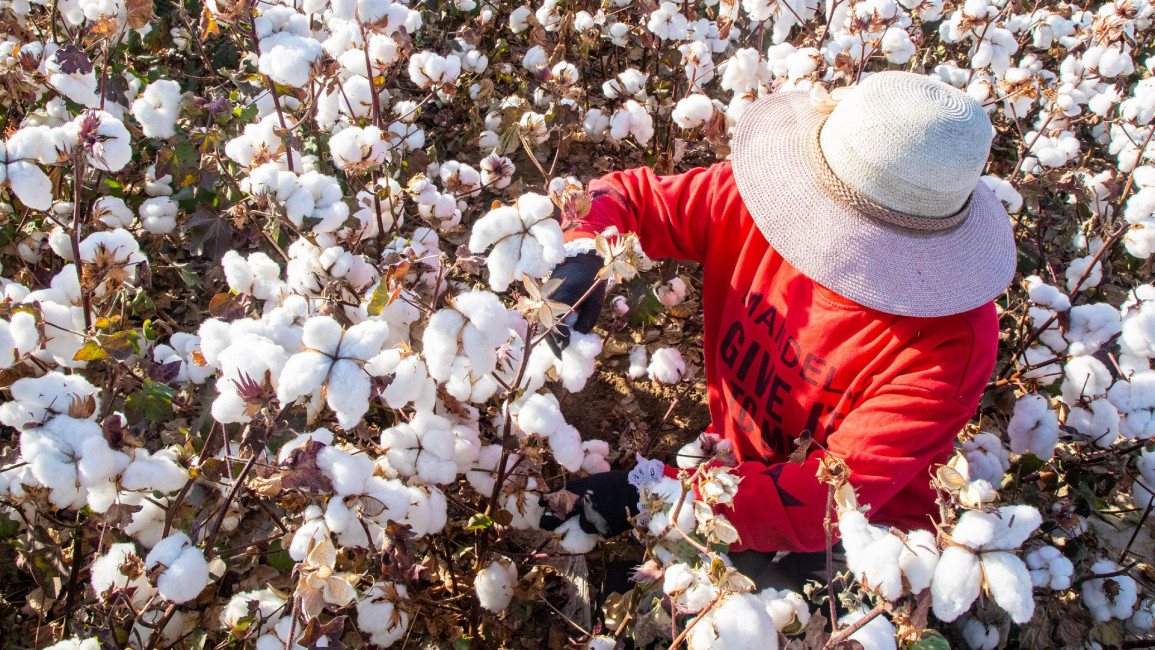
How capitalism is enabling China's Uighur repression
Campaigners and survivors have been calling on the international community to take action in light of China's detention camps where over a million Uighur Muslims are being held. There is growing evidence of the Chinese government's "re-education" practices within these camps, including forcing people to drink alcohol, eat pork or barring them from fasting during the holy month of Ramadan. All this, in an attempt to force Muslims to discard their religious and cultural identities.
The report released by The Center for Global Policy (CGP) earlier this week comes following information that had already come to light in the last few years about the exploitation of minorities in textile factories in China. That should have already been a pretty loud alarm bell.
Over 20 percent of the world's cotton comes from China, 85 percent of which is from Xinjiang. In the past, migrants were a vital part of the cotton picking industry, but over time, their numbers started falling due to competition with other employment elsewhere. The labour China saw in its Uighurs has not only addressed this gap, but actually bolstered profit for growers.
This fresh evidence has further highlighted the agenda behind the internment of hundreds of thousands of the Uighur. While the report may have led to outrage across the world and to large brands scrambling to distance themselves, this newfound concern should not be taken at face value.
 |
In reality, these practices have long been the foundation of the fashion industry |  |
In reality, these practices have long been the foundation of the fashion industry. Exploitation has been so intensified by the relentless drive for profit that working conditions and pay have been driven down by ever intensifying global competition, leading to the ballooning of sweatshops across the globe from south-east Asia to the outskirts of Leicester in the UK.
What the public outrage is missing, is the fact that the Uighurs are being targeted by the Chinese state within the context of its huge infrastructural projects, in the context of the Belt And Road Initiative (BRI). This vast investment by the Chinese government in highways, railways and ports across central and South-Asia, as well as the Middle-East aims to facilitate the export of Chinese goods to European, Asian and African markets.
Twitter Post
|
Xinjiang province - historically a hotbed of resistance to Beijing's central rule - has become a potentially strategic chokepoint in the BRI's development. It must, therefore, be crushed; the accumulation of wealth both by Chinese manufacturers and western retailers, demands it.
Read more: China's Alibaba seeks to distance itself from Uighur facial-recognition software
The Trump administration - which has waged a racist war on the poor at home and abroad - has not banned the export of cotton from Xinjiang Production and Construction Corp (XPCC) out of the goodness of its heart. Profit is the bottom line and humanitarian concerns serve as a nice veneer for an intensifying trade war between the two countries. In fact, the Uighur Forced Labour Prevention Act is already being undermined, as the US Congress has been lobbied by companies like Nike to weaken it.
The Chinese state defends its use of what is deemed forced labour under the international convention under the guise of fighting poverty and getting people into work. This line of argument is a particularly stark version of a global logic that celebrates worsening working conditions and disciplinary measures as a poor palliative for structural employment crises.
In Britain, this takes the shape of the government celebrating higher numbers of employment, while the increased precarity, dire conditions and low pay of those employed is completely skirted over.
The ideological common ground goes further than this. The Chinese government has also been running this operation as an exercise in counter-extremism. From the mass displacement of rural communities, to the incarceration of hundreds of thousands of people, the state has done all of this - it declares - in the name of de-radicalisation.
The so-called 'War on Terror', bolstered by governments from the UK to the US is the justification for all states, it seems, to violate human rights. The targeting of Muslims, and their dehumanisation around the world has facilitated their ill-treatment in China, too.
 |
Our deradicalisation camps in the UK may not be centres of forced labour, but they are no less sinister for it |  |
Our deradicalisation camps in the UK may not be centres of forced labour, but they are no less sinister for it. In fact, their very logic - currently being exported across the Channel by the Macron administration in France - generates international norms which facilitate, normalise and provide ideological cover for the mass internment of the Uighurs in China.
The question here is one of political control through limits on civil liberties and intensified exploitation. In both Europe and China, Muslim populations serve as a testing ground for the full-scale assault on political freedoms while the language of counter-terrorism serves to justify the entire process.
Any country that directly benefits from the continued racist and repressive counter-extremism agenda to the tune of cheap labour within the garment industry, must be held accountable for the oppression of the Uighurs and all those caught in this cycle of violence and exploitation.
The ICC's recent rejection of Uighur civil rights campaigners' case against China further highlights that this justice will not be handed down from up high. Only a sustained alliance between retail workers in the West, garment workers in China, and civil rights campaigners in both can apply the necessary pressure on governments and companies by hitting them where it hurts, their profit margin.
Malia Bouattia is an activist, a former president of the National Union of Students, and co-founder of the Students not Suspects/Educators not Informants Network.
Follow her on Twitter: @MaliaBouattia
Have questions or comments? Email us at: editorial-english@alaraby.co.uk
Opinions expressed here are the author's own, and do not necessarily reflect those of her employer, or of The New Arab and its editorial board or staff.




